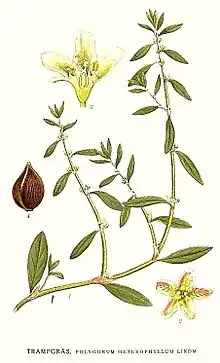Polygonum
See also: polygonum
Translingual
Etymology
From Ancient Greek πολύγονον (polúgonon, “knotweed”) from πολύς (polús, “many”) + γόνυ (gónu, “knee”) (though γόνος (gónos, “offspring”) has been suggested- the "knots" in "knotweed" are enlarged joints like knees, and it's certainly a prolific weed, so either derivation is plausible).
Proper noun
Polygonum n
- A taxonomic genus within the family Polygonaceae – including the various knotweeds, smartweeds, and bistort.
Usage notes
Sensu lato has frequently included the genera now in the tribe Persicarieae as sections, that is Persicaria, Bistorta, Cephalophilon and Koenigia (which last has also been delimited as Rubrivena and Aconogonon).
Hypernyms
- (genus): Eukaryota – superkingdom; Plantae – kingdom; Viridiplantae – subkingdom; Streptophyta – infrakingdom; Embryophyta – superphylum; Tracheophyta – phylum; Spermatophytina – subphylum; angiosperms, eudicots, core eudicots - clades; Caryophyllales - order; Polygonaceae - family; Polygonoideae - subfamily; Polygoneae - tribe; Polygoninae - subtribe
Hyponyms
- (genus): Polygonum aviculare (common knotgrass) - type species; for other species see
 Polygonum on WikipediaWikipedia and
Polygonum on WikipediaWikipedia and  Polygonum on Wikispecies.Wikispecies
Polygonum on Wikispecies.Wikispecies
Coordinate terms
- (genus in Polygoneae): Atraphaxis, Duma, Fallopia, Knorringia, Muehlenbeckia, Reynoutria - genera
References
- Hyam, R., Pankhurst, R.J. (1995) Plants and their names : a concise dictionary, Oxford: Oxford University Press, →ISBN p. 404.
- Coombes, Allen J. (1994) Dictionary of Plant Names, London: Hamlyn Books, →ISBN p. 148.
- Martinius, Matthias (1655) Lexicon Philologicum præcipue etymologicum et sacrum (in Latin), T. M. Goetzenius. Polygonum.
- Costea, Mihai, Tardif, François J., Hinds, Harold R. (1982 onwards) “Polygonum”, in Flora of North America Editorial Committee, editor, Flora of North America (online), eFloras.org
 Polygonum on Wikipedia.Wikipedia
Polygonum on Wikipedia.Wikipedia  Polygonum on Wikispecies.Wikispecies
Polygonum on Wikispecies.Wikispecies  Polygonum on Wikimedia Commons.Wikimedia Commons
Polygonum on Wikimedia Commons.Wikimedia Commons - Polygonum at The Plant List
This article is issued from Wiktionary. The text is licensed under Creative Commons - Attribution - Sharealike. Additional terms may apply for the media files.
